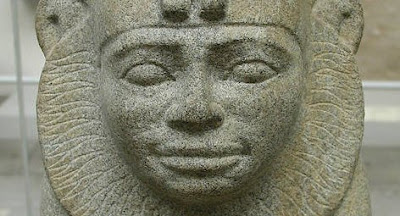
Sun Media says Will Smith is looking to add a sword-and-sandals epic to his resumé, and he’s got his eyes set on ancient Egypt:
Enter Taharqa, the last Pharaoh of the 25th or Nubian Dynasty (the one in which blacks of Ethiopian descent ran Egypt).
Carl Franklin (Devil In A Blue Dress) has already banged out a script called The Last Pharaoh, full of Ethiopians battling Assyrians for the throne of Amun-Ra. Now it’s being polished by Chris Hauty (Never Back Down), so look for some mixed martial arts to excite the masses.
“It’s an open writing assignment from Will’s company. It’s something he’s taken a big interest in,” says Hauty, who’s had a few projects fall apart in recent years (including an animated version of Moby Dick that Dreamworks started working on and dropped because it decided to get out of traditional animation after Spirit: Stallion of the Cimarron gave up the ghost at the box office).
Despite what the article says, it would seem Taharqa was not the last Pharaoh of his dynasty; Wikipedia indicates that Taharqa, who reigned 690-664 BC, was succeded by his nephew Tantamani, who reigned 664-656 BC. However, both Taharqa and his nephew had to contend with a rival dynasty that began with Necho I, who was “installed” by the Assyrians around 670 BC; and it was this rival dynasty that eventually booted Taharqa’s nephew off the throne. And of course, as the article itself states, the last Pharaoh of any dynasty was Cleopatra, who died several centuries later in 30 BC. But what can one say, filmmakers seem to like titles with the word “last” in them.
Given the title, it seems a safe bet this film will focus on the end of Taharqa’s reign, rather than the beginning. But if we step back a few decades, to Taharqa’s early years, it turns out there is an interesting connection between Taharqa and the biblical history of this period. Scholars, it seems, have said that Taharqa may be the same person who is referred to in II Kings 19 and Isaiah 37 as “Tirhakah, the Cushite king of Egypt” — a figure who is mentioned simply because he was “marching out to fight” against the Assyrian king Sennacherib while Sennacherib was laying siege to Jerusalem in 701 BC.
There is one slight problem with making a simple equation between Taharqa and Tirhakah, and that is the fact that Taharqa was not actually king of Egypt until about a decade after the incident described in the Bible. However, it seems that Taharqa’s brother Shebitku was the Pharaoh at this time, and Taharqa did lead the army in his name, so it is possible that the author of this passage — which also describes the death of Sennacherib in 681 BC — was writing at a later date and conflating Taharqa’s military leadership with his later reign as Pharaoh.
One other interesting detail: Sennacherib did a lot of damage in Judea; he himself claimed to have destroyed 46 cities, and he decorated his palace with stone panels depicting the destruction of Lachish, stone panels that are now on display at the British Museum in London. But he failed to take Jerusalem itself, and the biblical accounts say he failed because “the angel of the LORD went out and put to death a hundred and eighty-five thousand men in the Assyrian camp.” The Greek historian Herodotus, who lived a few centuries later, tells a similar story about Sennacherib being defeated by divine intervention — but the story he tells takes place during a battle against the Egyptians. However, Herodotus says the Pharaoh at that time was named Sethos, so his information would seem to be a bit garbled.
Whether any of this data will make its way into the Will Smith movie, who knows, but it does give the story some extra context, and I, for one, am curious to see whether the film will deal with it — and, if so, how. Will the Greek and Hebrew stories be treated as two separate incidents? As two different facets or versions of the same basic incident? Or will either or both of the stories be ignored altogether?
One final thought: In the past, people have debated the merits of black actors playing ancient figures like Jesus and Hannibal whose ethnic make-up was either decidedly different or a matter of some controversy — but it seems a safe bet that no one will complain about historical inaccuracy if Will Smith plays a Nubian king.












